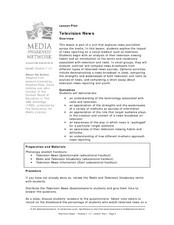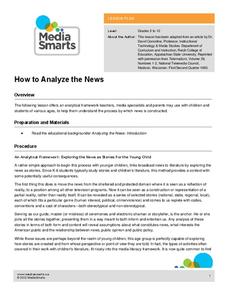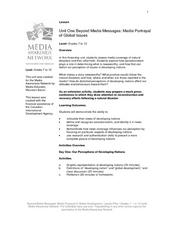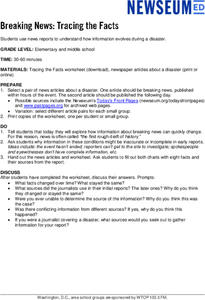Curated OER
News or Propaganda?
What is considered news vs. propaganda? Learners will discuss objectivity and press responsibility while exploring these two concepts. They work in small groups to explore the article in-depth, guided by reading comprehension and...
The New York Times
Evaluating Sources in a ‘Post-Truth’ World: Ideas for Teaching and Learning about Fake News
The framers of the United States Constitution felt a free press was so essential to a democracy that they granted the press the protection it needed to hold the powerful to account in the First Amendment. Today, digital natives need to...
Brown University
Analyzing the News
With so many ways to follow the news today, it is imperative to think critically about the sources of information we are turning to. Here is a fantastic graphic organizer that will help your learners develop the skills to properly...
Facing History and Ourselves
The Importance of a Free Press
"Congress shall make no law . . . abridging the freedom of speech, or of the press;. . ." Why is this guarantee of free speech and a free press the First Amendment to the US Constitution? Why are these rights so essential to a democracy?...
Media Smarts
Bias in News Sources
As young consumers of media, it is important for high schoolers to explore concepts of bias and prejudice, and how they may be present in media. After discussing ideological messages that media can contain, individuals complete a warm-up...
Curated OER
Student News And Weather Channel
Fabulous! Your 5th graders should love this project. As an ongoing lesson plan throughout the year students use temperature probes to record outside temperature and then document their data using spreadsheets. They use their weather data...
Curated OER
News Journalism Across the Media: Introduction
Although students are aware of news as information that influences their perceptions of the world, they are often unaware of the various ways to present that information. Encourage them to investigate, discuss, analyze and make valuable...
Curated OER
Television News
Different media sources portray news in a variety of ways. In groups of three, learners look at different news sources, bringing in all the findings the next day. Three handouts help scholars compare sources, define specific terms used...
Newseum
Fake News Through History: Analyzing Historical Sources
Unfortunately, fake news, fuzzy facts, and bogus news stories are not new phenomena. Class members use a "Fake News Through History" worksheet to analyze historical examples of false, invented, made-up news. Researchers share their...
Newseum
Free Press Challenges Through History: Analyzing Historical Sources
The debate over the integrity of stories in media is not new. Young journalists analyze historical sources that reveal freedom of the press controversies and draw parallels to challenges freedom of the press faces today.
Newseum
The Press and the Presidency: Friend or Foe? How the President Is Portrayed
In theory, news reports should be fair and unbiased. Young journalists test this theory by selecting a current news story covered by various media outlets about the President of the United States. They then locate and analyze five...
Media Smarts
How to Analyze the News
Teach kids how to watch television, specifically the news, with this creative idea for learners of all ages from the Media Awareness Network. The elementary school plan focuses on presenting news as a story and uses Jon Scieszka's story...
Curated OER
Beyond Media Messages: Media Portrayal of Global Issues
Take a close look at news reporting techniques and global issues. Begin by creating a graphic representation of developing nations and defining the term. After class discussion, the second day's activities pick up by deconstructing news...
Curated OER
Information Overload: Looking at News
How do events reported in mainstream newspapers, on television news, blog posts, and social network sites differ? Ask your class to investigate the way the same news item is presented in the many information sources available. Groups...
Curated OER
Lesson 3: Writing a News Story
Start a writing lesson by examining a news video that explains writing clearly, concisely, and correctly. Learners consider the importance of writing news properly to avoid breaking the law, then write their own weekend news stories.
Newseum
Breaking News: Tracing the Facts
Breaking news reports can be short of facts. Young journalists select a pair of news articles about a disaster; one published within hours of the event and the second published the following day. They examine whether facts in the report...
Rockefeller Archive Center
Understanding Mass Media News
In an age of fake news and photoshopped images, it is vital that 21st century learners development the skills they need to evaluate mass media and assess its validity. A great way to launch such a study is with a carefully crafted lesson...
Curated OER
Radio News
Part of a larger unit from the Media Awareness Network on media literacy, this particular lesson plan focuses on the medium of news radio. Small groups participate in discussions on their radio listening habits as well as the...
Newseum
Covering a Catastrophe: Evaluating Disaster News
Young journalists investigate the various ways to share news about a disaster and evaluate the pros and cons of each of these types of news. Individuals then select two different forms of media reports of a recent disaster. Using the...
Curated OER
The Pledge of News
Students explore the fundamentals of news-gathering, the etiquette of reporting, and the rights a news writer/reporter has. They review the parts of a news story and write an article discussing their beliefs about the Pledge iof Allegiance.
News Literacy Project
News Goggles: Lionel Ramos, Oklahoma Watch
Given all the recent criticism of the news media and coverage, it's crucial that young people are given the tools they need to evaluate what they see, hear, and read about current events. A video interview from "News Goggles" introduces...
Teach Engineering
News Flash!
Extra, extra, read all about it! Scholars research information on endangered species and produce a news report to share their findings with the rest of the class. In groups, they then consider engineering solutions to problems on habitat...
Curated OER
Math News
Young writers design and publish a newsletter with articles that demonstrate knowledge of mathematical concepts. They explain mathematical procedures and basic operations in a news article format. Next, they compile several articles to...
PBS
The Media and the War: The Penny Press, Walt Whitman and the War
The Mexican-American war marked a significant moment in United States history, as well as in the history of American media. The mid-nineteenth century saw the introduction of the Penny Press, which provided many American citizens with...
Other popular searches
- Daily and National Newspapers
- Using the Daily Newspaper
- Daily Classroom News
- Daily Morning News Show

























